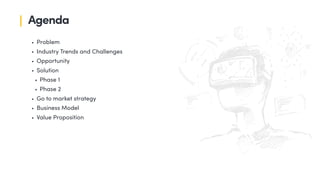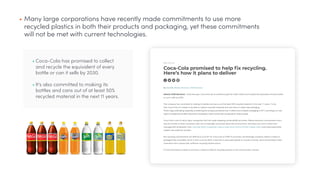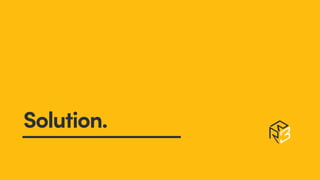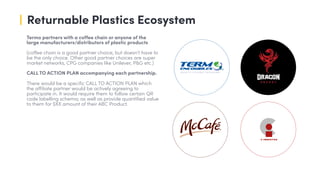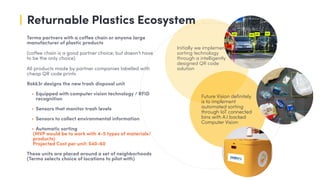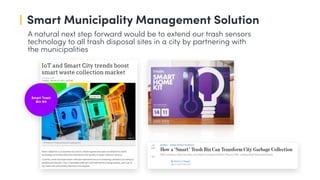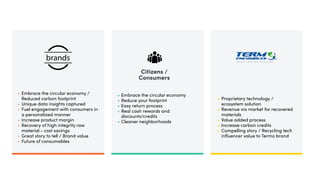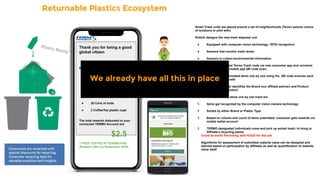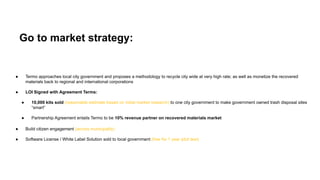#2 - Smart Bins - Returnable Plastic Ecosystem.pdf
- 1. Termo Venture Builder R e c y c l a b l e P l a s t i c s E c o s y s t e m Copyright © 2019 ROKK3R INC. All rights reserved.
- 2. • Problem • Industry Trends and Challenges • Opportunity • Solution • Phase 1 • Phase 2 • Go to market strategy • Business Model • Value Proposition Agenda
- 3. Sustainability PROBLEM: A majority of the plastics used are never recovered: globally, almost 90% of plastic waste ends up in a landfill, incinerator, or, worse, in our oceans. Incentivizing and monetizing the value chain of recycling
- 4. A big contributor to this problems is the average citizen - who doesn’t currently sort their personal trash better Mixing organic waste with in-organic waste causes 80% of everything to go to waste Problem: Most people care about the environment unless it costs them something In today’s age of slowing socio economic growth globally; time is a valuable commodity for everyone. Hence recycling at the consumer level is still difficult unless there is an incentive attached.
- 5. • We are at an inflection point; governments and consumers are viewing plastics pollution as an urgent environmental problem, yet one without a clear solution. • Many large corporations have recently made commitments to use more recycled plastics in both their products and packaging, yet these commitments will not be met with current technologies. • This momentum is driving many new companies to innovate (at least 60 technology providers to our knowledge) to develop innovative chemical recycling solutions. But they need investment to scale more quickly. • Time / severity of problem is creating conditions of urgency for brands and investors to seize the opportunities presented by today’s landscape of innovators and the growing demand for recycled materials. Global Trens
- 6. “a returnable PET plastic bottle, if its conditions remain optimal, can be reused about 15 times” “when the returnable bottles of both glass and plastic carried a permanent label (of paint) that part could not be recovered: the bottle had to be cut after its end of life and discarded that section. In the Single Bottle, as the container can be filled with different sodas, a paper label is used; Therefore, the packaging is 100% recyclable.” • We are at an inflection point; governments and consumers are viewing plastics pollution as an urgent environmental problem, yet one without a clear solution. Alejandro Zocchi , Affordability Manager for Coca-Cola of Argentina, Paraguay & Uruguay and Mathias Perez Güimil , Single Serve Manager for Coca-Cola of Argentina, Paraguay & Uruguay companies like Coca Cola (and others) are trying to figure out ways to reduce their use of virgin plastics and better ways to increase recycling. Coca-Cola produced 3.3 million tons of plastic in 2017, it disclosed in a recent report by the Ellen MacArthur foundation.
- 7. “Each brand had until now its own returnable bottle that identified it; for example, that of green Sprite with bubbles and that of transparent Coca-Cola and its characteristic shape. Each bottler of the Company had to recover a certain amount of packaging of each beverage before operating the production line. With the new single bottle it is not necessary to wait to have a batch of packages available by brand, but it allows any brand in the same bottle, simplifying the operation of packaging classification and filling. In any case, the two returnable models currently coexist; The process will be completed in about two years.” “ What seems very simple in a talk meant a great investment of the Coca-Cola System , which had to adapt lines and compare new labellers. In Argentina, for example, 17 lines are being modified. This mode of operation will also allow more closely follow consumer preferences and expedite the reformulation of recipes.” • Time / severity of situation is creating conditions of urgency for brands to seize the opportunities presented by today’s landscape of innovators and the growing demand for recycled materials. Alejandro Zocchi , Affordability Manager for Coca-Cola of Argentina, Paraguay & Uruguay and Mathias Perez Güimil , Single Serve Manager for Coca-Cola of Argentina, Paraguay & Uruguay companies like Coca Cola (and others) are trying to figure out ways to reduce their use of virgin plastics and better ways to increase recycling. By 2020, we aim to recycle at least 90% of our waste in each of our bottling plants. At year-end 2018, 93% of our plants successfully achieved this goal. Importantly, in Mexico, our plants recycled 100% of the waste generated in our production processes. Overall, we recycled 95% or approximately 134,000 tons of manufacturing waste generated. CORPORATIONS AND BRANDS ALL OVER THE WORLD ARE LOOKING TO INNOVATIVE WAYS TO RECOVER THEIR PRODUCTS POST CONSUMPTION
- 8. There is tremendous value in recovering e-Waste from all over the world! Especially the developing countries where mobile penetration has recently taken off. • Time / severity of situation is creating conditions of urgency for brands to seize the opportunities presented by today’s landscape of innovators and the growing demand for recycled materials. CORPORATIONS AND BRANDS ALL OVER THE WORLD ARE LOOKING TO INNOVATIVE WAYS TO RECOVER THEIR PRODUCTS POST CONSUMPTION Google pays for broken and cracked screen phones of almost all major brands
- 9. • Coca-Cola has promised to collect and recycle the equivalent of every bottle or can it sells by 2030. • It's also committed to making its bottles and cans out of at least 50% recycled material in the next 11 years. • Many large corporations have recently made commitments to use more recycled plastics in both their products and packaging, yet these commitments will not be met with current technologies.
- 10. • Many large corporations have recently made commitments to use more recycled plastics in both their products and packaging, yet these commitments will not be met with current technologies. Our 2020 Goals To recycle at least 90% of the waste we generate in every one of our botting plants. To include 25% of recycled materials in our PET packaging.
- 11. SUCCESS STORIES to learn from / worth replicating Similar Solutions / Competitive Landscape
- 12. Bigbelly was founded in 2003 with the goal of transforming one of the least efficient and resource-intensive industries on the planet — waste collection. Cities were either collecting too often and wasting fuel and labor while creating CO2 emissions or they were not able to keep up with the demands and overflowing trash cans created litter, health and safety issues. In the following years, the company has evolved to offer a unique solution for the public space by leveraging renewable solar energy and information technology. With the efficiency gains their customers realize, Bigbelly has been instrumental in the implementation of the first widespread public space recycling programs in cities such as Philadelphia, Chicago and Boston and is now pioneering public space compostables collection as well. Bigbelly has been recognized as an industry leader in the waste management, environmental, and innovative technology spaces and is recognized as a C40 Cities Climate Leadership Group best practice. With their solutions deployed in every state and more than 47 countries worldwide, Bigbelly continues bringing its Smart Waste & Recycling System to every corner of the world. Similar Solutions / Competitive Landscape
- 13. Companies are innovating to meet the need (See more examples in APPENDIX) Over 14 million disposable coffee cups are used every day in the UK, with just 1% being recycled. CupClub is the world's first returnable packaging service for drinks that utilizes RFID technology and cloud-based IoT software to provide complete supply chain traceability to brands and retailers, making drinking coffee on-the-go more sustainable. CupClub, a returnable packaging service for drinks managed through cloud-based IoT software, has closed a $460K (£360K) pre-seed round with Seedcamp, joining previously announced backers R/GA Ventures, Ellen MacArthur Foundation and a number of Angel investors. British tech startup CupClub, a returnable packaging service for drinks provided to brands and retailers to eliminate single-use cups, has raised pre seed funding from institutional investors Seedcamp, R/GA Ventures and a number of Angel investors to tackle the global plastics epidemic. Over 14 million disposable coffee cups are used every day in the UK, with just 1% being recycled. CupClub is the world's first returnable packaging service for drinks that utilizes RFID technology and cloud-based IoT software to provide complete supply chain traceability to brands and retailers, making drinking coffee on-the-go more sustainable. Following a successful trial with catering company CH&Co and a pilot with commercial real estate group Cushman & Wakefield to integrate its returnable packaging service for drinks across cafes and canteens in university and HQ offices, CupClub has secured $460K (£360K) in private investment to develop its product and drive expansion across London. In some markets around the world, including South Asia, Coca-Cola sends their beverages to distributors in glass bottles, who then collect, wash, and refill them. In these cultures, the idea of returning a container has been normalized, and Qureshi (Founder and CEO) believes the same could happen with CupClub • This momentum is driving many new companies to innovate to develop innovative recycling solutions. Companies are innovating to meet the need (See more examples in APPENDIX)
- 14. Opportunity With global plastics demand forecasted to triple by 2050, there is a tremendous missed opportunity – in both economic and environmental value – to turn this plastic into the building blocks for new materials, instead of more poorly managed waste. It's not as easy as it seems though as 80% of the problem lies with the waste of value at the average citizen level due to improper sorting. Imagine a solution that truly captures recyclable value (through rewards or penalties) by incentivizing better sorting habit at the consumer level. It's not hard to fathom such a solution scaling quickly to emerge as a regional (possibly global) winner Value lost
- 15. (Sensor + Sorting Technology) Consumer Rewards / Innovative Financing Model / Recovered Materials Ecosystem (Sensor Technology) Distributor Sales model Opportunity! CLEAR GAP Opportunity to develop affordable trash bin technology for SORTING trash and creating a new market for the recovered materials to be monetized by corporations responsible for producing the products recovered
- 16. Solution.
- 17. to incentivize the average consumer to follow better sorting habits (particularly sorting organic and in- organic waste separately), towards the goal of being able to extract valuable waste items from the value chain in a manner that leads to cost savings compared to the status quo methodologies. Returnable Plastics Ecosystem Latin America’s first returnable plastics ecosystem which recycle and replaces the 100 billion plastics products used in El-Salvador and Vietnam every year. This is a multi-phased solution which leverages Partnerships with ecosystem stakeholders (corporations, and government) Sophisticated technology (computer vision, RFIDs/QR codes, sensor, networks) Business model Innovation (reward mechanism for good sorting habits among consumers)
- 19. Plastic bottle Let’s unpack this phase by phase
- 20. Phase 1.
- 21. Returnable Plastics Ecosystem Termo partners with a coffee chain or anyone of the large manufacturers/distributors of plastic products (coffee chain is a good partner choice; but doesn’t have to be the only choice. Other good partner choices are super market networks, CPG companies like Unilever, P&G etc.) CALL TO ACTION PLAN accompanying each partnership. There would be a specific CALL TO ACTION PLAN which the affiliate partner would be actively agreeing to participate in. It would require them to follow certain QR code labelling schema; as well as provide quantified value to them for $XX amount of their ABC Product.
- 22. Returnable Plastics Ecosystem Termo partners with a coffee chain or anyone large manufacturers/distributors of plastic products (coffee chain is a good partner choice; but doesn’t have to be the only choice. Other good partner choices are super market networks, CPG companies like Unilever, P&G etc.) All products made by partner companies labelled with new QR code printouts which label sufficient data to meet TERMO CALL TO ACTION requirements. • Product material? • Recovered product price per unit? • Product retail price?
- 23. Returnable Plastics Ecosystem Termo partners with a coffee chain or anyone large manufacturer of plastic products (coffee chain is a good partner choice; but doesn’t have to be the only choice) All products made by partner companies labelled with cheap QR code prints Rokk3r designs the new trash disposal unit • Equipped with computer vision technology / RFID recognition • Sensors that monitor trash levels • Sensors to collect environmental information • Automatic sorting (MVP would be to work with 4-5 types of materials/ products) Projected Cost per unit: $40-60 These units are placed around a set of neighborhoods (Termo selects choice of locations to pilot with) Initially we implement sorting technology through a intelligently designed QR code solution Future Vision definitely is to implement automated sorting through IoT connected bins with A.I backed Computer Vision
- 24. Returnable Plastics Ecosystem Termo partners with a coffee chain or anyone large manufacturer of plastic products (coffee chain is a good partner choice; but doesn’t have to be the only choice) All products made by partner companies labelled with cheap QR code prints Rokk3r designs the new trash disposal unit • Equipped with computer vision technology / RFID recognition • Sensors that monitor trash levels • Sensors to collect environmental information These units are placed around a set of neighborhoods (Termo selects choice of locations to pilot with) Scanning the products QR Code at Home will guide+educate the user on best practices to follow for clean and well sorted Recycling At the of one week - Consumer locates nearest Termo Trash node via new consumer app and connects with system using their mobile app QR code scan; 1. Scans the accumulated items one by one using the QR code scanner each bin is equipped with 2. QR code scanner identifies the Brand (our affiliate partner) and Product Type for each product Consumer gets information on how to recycle different parts of each product, according to the recycling scheme in the local area. Consumer actions recorded in the cloud For example: A pack of 6 beer bottles consist of a cardboard sleeve, glass bottle and metal cap.
- 25. Plastic bottle Returnable Plastics Ecosystem Termo partners with a coffee chain or anyone large manufacturer of plastic products (coffee chain is a good partner choice; but doesn’t have to be the only choice) All products made by partner companies labelled with cheap QR code prints Rokk3r designs the new trash disposal unit • Equipped with computer vision technology / RFID recognition • Sensors that monitor trash levels • Sensors to collect environmental information These units are placed around a set of neighborhoods (Termo selects choice of locations to pilot with) Consumer locates nearest Termo Trash node via new consumer app and connects with system using their mobile app QR code scan; 1. Scans the accumulated items one by one using the QR code scanner each bin is equipped with 2. QR code scanner identifies the Brand (our affiliate partner) and Product Type for each product 3. Consumer drop items one by one into the trash bin. 4. Items get recognized by the computer vision camera technology 5. Sorted by either Brand or Plastic Type If item deposited by consumer is not of the type or brand we work with; then the item can be rejected
- 26. Thank you for being a good global citizen Based on your submission of: • 12 bottles of DOVE shampoo • 2 bottles of 1 Litre Coca Cola • 15 Thermoplastic polyethylene bags • 20 Cans of soda • 2 Coffee/Tea plastic cups The total rewards disbursed to your connected TERMO Account are: 1 FREE COFFEE AT STARBUCKS (Redeem offer by September 2020) $2.5 Returnable Plastics Ecosystem Consumer are rewarded with special discounts for recycling. Consumer recycling data for valuable analytics and insights. Termo partners with a coffee chain or anyone large manufacturer of plastic products (coffee chain is a good partner choice; but doesn’t have to be the only choice) All products made by partner companies labelled with cheap QR code prints Rokk3r designs the new trash disposal unit • Equipped with computer vision technology / RFID recognition • Sensors that monitor trash levels • Sensors to collect environmental information These units are placed around a set of neighborhoods (Termo selects choice of locations to pilot with) Consumer locates nearest Termo Trash node via new consumer app and connects with system using their mobile app QR code scan; 1. Scans the accumulated items one by one using the QR code scanner each bin is equipped with 2. QR code scanner identifies the Brand (our affiliate partner) and Product Type for each product 3. Consumer drop items one by one trash bin. 4. Items get recognized by the computer vision camera technology 5. Sorted by either Brand or Plastic Type 6. Based on volume and count of items submitted; consumer gets 90% rewards via mobile wallet account; 10% goes Termo Algorithms for assessment of submitted material value can be designed and tailored based on participation by affiliates as well as quantification of rewards value itself
- 27. Returnable Plastics Ecosystem Termo partners with a coffee chain or anyone large manufacturer of plastic products (coffee chain is a good partner choice; but doesn’t have to be the only choice) All products made by partner companies labelled with cheap QR code prints Rokk3r designs the new trash disposal unit • Equipped with computer vision technology / RFID recognition • Sensors that monitor trash levels • Sensors to collect environmental information These units are placed around a set of neighborhoods (Termo selects choice of locations to pilot with) Consumer locates nearest Termo Trash node via new consumer app and connects with system using their mobile app QR code scan; 1. Scans the accumulated items one by one using the QR code scanner each bin is equipped with 2. QR code scanner identifies the Brand (our affiliate partner) and Product Type for each product 3. Consumer drop items one by one trash bin. 4. Items get recognized by the computer vision camera technology 5. Sorted by either Brand or Plastic Type 6. Based on volume and count of items submitted; consumer gets 90% rewards via mobile wallet account; 10% goes Termo 7. TERMO designated individuals come and pick up sorted trash; to bring to Affiliate’s recycling plants Could be worth Partnering with HUGO for this job
- 28. Returnable Plastics Ecosystem supported by a new digital platform - where the (invaluable) data we collect is aggregated and made available to consumers, affiliate corporations and local governments Separate business models for each segment Product and recycling data is aggragated in the cloud, to be made available to consumers. Master product data from participating brands Packaging recycling data using GS1 and international standards Data on local waste recycling from city councils
- 29. Based on your submission of: • 12 bottles of DOVE shampoo • 2 bottles of 1 Litre Coca Cola • 15 Thermoplastic polyethylene bags • 20 Cans of soda • 2 Coffee/Tea plastic cups Giving our affiliate brands an opportunity to understand consumption per individual (or household) AND connect with consumers in a personalized manner like never before While at the same time capturing disposed plastic items for their products at a point of time when it has not been denigrated by being mixed with organic waste - leading to tangible future cost savings Our 2020 Goals To recycle at least 90% of the waste we generate in every one of our botting plants. To include 25% of recycled materials in our PET packaging. Remember: companies like Coca Cola (and others) are trying to figure out ways to reduce their use of virgin plastics and better ways to increase recycling.
- 30. And capture invaluable city wide environmental data City wide insight monitored via a simple dashboard view Urban Data Collection Air quality sensing Noise pullution monitoring Pot-hole detention Graffiti hot-spotting Vacant home cataloging Insfrastructure contidition reporting (broken curbs cuts, downed power lines, fallen trees)
- 31. Overview Flow: $$, Data and Returnable materials Governments/ Municipalities Recycling Companies Brands/ Corporations New bottle Brands Designated Workforce / Consumer Used bottle Data Data Data
- 32. Depending on the condition of product returned: 1) Pristine: MVP Key Tenets Initially we implement Sorting technology through An intelligently designed QR code solution Plastic bottle 2) Bad Shape: Back to Brand/Corp (Coffee shops, Bottle Manufacturers, CPGs) → They need to be able to process material for reuse or we do it? Will Brand or Governments pay to get products back in pristine condition? Why do they want them? What do they want to do with them? Back to Governments/Municipalities? Future Vision is to implement automated sorting through IoT connected bins with A.I backed Computer Vision → Back to Recycling Companies → Will the recycler be interested in clean (not mixed with organic waste) trash that is not in pristine shape? How much will they pay? What do they use the trash for?
- 33. Having perfected our recognition technology by more testing and validation; we expand to work with all brands (even those which are not initial Affiliates) and expand solution into more regions Phase 2. (Exponentiality)
- 34. 24 million watches sold per year 88 million shoes sold per year 86 million sunglasses sold per year Total available market likely a varying percentage of consumer goods sold by any brand that integrates a recyclable product such as plastic, glass, e-waste and aluminum. Higher value products = Higher $ Revenue. Everything You Buy Should Be Recycled Apple Textiles Consumer Goods Electronic Waste Return
- 35. Smart Municipality Management Solution Phase 3.
- 36. Smart Trash Bin Kit A natural next step forward would be to extend our trash sensors technology to all trash disposal sites in a city by partnering with the municipalities Smart Municipality Management Solution
- 38. Business model.
- 39. Unit Economics Assumptions: • Value of recovered product to companies in the recycling value chain is greater than the cost of rewarding consumer for better sorting • Average output assumed for 10 households (~30 people): • 10 cans of coca cola - which are worth $0.17 in recycling market • 10 glass bottles worth $0.05 each • 20 coffee cups / plastic cups worth $0.01 each • One bin will service 10 households (3 members each) ~ 30 people Revenue Available: • Revenue from recovered materials market • (10 x $0.17) + (10 x $0.05) + (20 x $0.01) = $2.4 • $2.4 per bin per week x 52 weeks per year • = $124.80 in total available revenue per bin per year • Termo likely nets $1.24 per bin per year ROI less than 1 year, and revenue continues for life of bin
- 40. 1000 Smart Trash Bins developed and deployed in an upscale city/neighborhood in El-Salvador Unit Economics at Scale Assumptions: • Value of recovered product to companies in the recycling value chain is greater than the cost of rewarding consumer for better sorting • Consumer volume: 10,000 households • Assuming Consumers deposits weekly stored items (CONSERVATIVE SCENARIO) ○ 10 cans of coca cola - which are worth 1$ in recycling market ○ 10 glass bottles worth $0.10 each ○ 20 coffee cups / plastic cups worth $0.05 each • Revenue from recovered materials market (Termo gets 10% in perpetuity) = 10,000 x ($1 + 10x $0.10 + 20x $0.05) * 10% = 10,000 people x $3 per household per week * 10% = 30,000$ per week => $1.56M in Year 1 * 10% = $156,000 • Cost to Deploy = ~$100,000 Cost per unit: • Camera s ($5 x 2): $10 • Sensors (temp, IR etc.): $12 • QR code scanner: $5-10 • Robotic motor arms (2): $4-10 • Building material (body): $10-20 Total trash unit cost: $41 - 61 1000 Units: $41,000 - 61,000 Initial Reward Cash for 100 contracted workers: • $10 per week; $520 per year • 100 workers; $52,000 $100k Needed
- 41. • At scale, we anticipate tracking materials recycled from over 10 brands per market. • We anticipate brands value the data on the end user and end life of their products to be at consistent with industry averages. • Initial pricing for these insights will be set at $0.10 per user per month. (MVP assumption is 10,000 consumers engaging with the smart bins ecosystem) • Assuming we can sell insights from our collection services to each of these brands at a rate of $12,000 per brand per market (city) per year. • This would enable us to collect an additional revenue of $120,000 per city these bins are deployed in. Additional Sources of Revenue Enterprise SaaS
- 42. Go to market strategy (Phase 1 and 2) • Build at deploy 1000 prototype units to an upscale city/neighborhood in El Salvador that reward people in some format for recycling (TBD via mobile app) (Cost: $50,000) • Hire (or incentivize staff on demand) ~100 people ( Termo selected and trained) to collect recycling and deposit into our designated smart bins. (Cost: $52,000 a year) • Pay for local advertising via radio, social, flyers, etc. to get more people to participate. • Partner with local businesses to promote recycling of disposable products into these bins (think local coffee shops). • Termo to collect all recycling and manually sort/sell to market (to test market appetite, value, and contract conditions). • Then review results and plan to scale as appropriate.
- 43. Assumptions: • 1,000 units deployed to service 10,000 households • 10 brands paying $1,000 per month for the insight of 10,000 households • Cost: $50/bin x 1,000 bins = $50,000 Total Cost: $50,000 Revenue Available: • 1,000 bins x $124.80/bin = $124,800/year • 10 brands x $1,000/mo x 12 months = $120,000/year • Total Revenue:$244,800 per year for MVP Test MVP Economics
- 44. 1. What is the value of the recovered materials recycled by a single bin (servicing 10 households) in a single week? a. What are the highest valued materials? b. What are the easiest to process and recycle? c. What are the most commonly disposed of by a single household? 2. What is the value of the recovered product to each Partner? (Partners asked to quantify value of recycled goods to them specifically; ask them to provide self pick up crew to extract valuable sorted trash?eg. 10 coca cola cans worth $1, what is the value to a coffee chain of 1 cup returned?) 3. What is the real cost of a single bin: to build, install, and service? 4. What level of discernation should the Computer Vision system have to make the business work? (BRAND vs MATERIAL) 5. What is the best mechanism to disburse the reward if the items submitted by the designated individual are actually coming from more than one household? (we suggest that the designated individual should on-board the other households he wants to work with using the app as well as unique code that links the designated person with the houses they are collecting trash from) Key Validation Questions (Phase 1 / MVP)
- 45. Category Method Success Metric Brand & Story • Product Mockups • Sales Materials (Termo to determine) • Rokk3r Approved • Termo to Approve Market Interest • Reach out to 10 brands and gauge value of recycled materials. • Pitch concept to 10 municipalities and see appetite for paying $12-50k/yr for data insights and to “close the loop” • Initial interest by 2-3 brands • Price acceptance. Technical Feasibility • Architecture and design for sorting unit, confirmation that machine vision possible for these materials • Logistical plan for deploying and maintaining and collecting from these units • Technical diagram, cost sheet, and preferred methods/brands • 10 page Process Design document Business Model • Unit economics in detail • Five year cash flow statement • Rokk3r & Termo approved • Positive NPV @ 30% discount Investability • Present all findings to Board for investment and/ or acquisition review • Approval that someone reputable would invest or buy finished company
- 46. Citizens / Consumers • Embrace the circular economy / Reduced carbon footprint • Unique data insights captured • Fuel engagement with consumers in a personalized manner • Increase product margin • Recovery of high integrity raw material - cost savings • Great story to tell / Brand value • Future of consumables • Embrace the circular economy • Reduce your footprint • Easy return process • Real cash rewards and discounts/credits • Cleaner neighborhoods • Proprietary technology / ecosystem solution • Revenue via market for recovered materials • Value added process • Increase carbon credits • Compelling story / Recycling tech influencer value to Termo brand
- 47. Staff on Demand Community & Crowd Algorithms Leveraged Assets Engagement Interfaces Dashboards Experimentation Autonomy Social Technologies S A I D S C A L E E INTERNAL CHARACTERISTICS EXTERNAL CHARACTERISTICS T M P Building an Exponential Organization from the Ground Up urpose ransformative assive
- 48. Appendix.
- 49. Phase 3 Smart Municipality Management Solution A natural next step forward would be to extend our trash sensors technology to all trash disposal sites in a city by partnering with the municipalities (win-win value proposition) Smart Trash Bin Kit
- 50. Municipalities around the world are ill equipped to deal with the huge problem of large volume trash sorting And ill-equipped to monetize the trash to regional and international corporations 75%+ of Landfill composed of reusable materials that can not be recovered now £140 million worth of clothing goes into landfill each year. 91% of plastic goes unrecycled, that’s 2,376 pounds for every person on the planet. The United States throws away $11.4 billion worth of recyclable containers and packaging every year.
- 51. Opportunity
- 52. Municipality Management Solution This solution leverages ● Partnerships with ecosystem stakeholders ● Sophisticated technology (computer vision, RFIDs/QR codes, sensor, networks) to extract valuable waste items from the value chain in a manner that leads to cost savings compared to the status quo methodologies.
- 53. Smart Trash Bin Kit
- 54. Benefits to City Technology enabled municipalities
- 55. In a previous part of this document we presented the Returnable Plastics Ecosystem
- 56. Returnable Plastics Ecosystem Smart Trash units are placed around a set of neighborhoods (Termo selects choice of locations to pilot with) Rokk3r designs the new trash disposal unit ● Equipped with computer vision technology / RFID recognition ● Sensors that monitor trash levels ● Sensors to collect environmental information Consumer locates nearest Termo Trash node via new consumer app and connects with system using their mobile app QR code scan; 1. Scans the accumulated items one by one using the QR code scanner each bin is equipped with 1. QR code scanner identifies the Brand (our affiliate partner) and Product Type for each product 1. Consumer drop items one by one trash bin. 1. Items get recognized by the computer vision camera technology 1. Sorted by either Brand or Plastic Type 1. Based on volume and count of items submitted; consumer gets rewards via mobile wallet account 1. TERMO designated individuals come and pick up sorted trash; to bring to Affiliate’s recycling plants Could be worth Partnering with HUGO for this job Algorithms for assessment of submitted material value can be designed and tailored based on participation by affiliates as well as quantification of rewards value itself Thank you for being a good global citizen Based on your submission of: ● 12 bottles of DOVE shampoo ● 2 bottles of 1 Litre Coca Cola ● 15 Thermoplastic polyethylene bags ● 20 Cans of soda ● 2 Coffee/Tea plastic cups The total rewards disbursed to your connected TERMO Account are: $2.5 1 FREE COFFEE AT STARBUCKS (Redeem offer by September 2020) We already have all this in place
- 57. We would essentially partner with municipalities to sell them the technology to make all public recycling nodes in El-Salvador “smart bins” - which represents an opportunity to capture even more trash volume at an earlier stage as well many other value propositions El-Salvador Total Addressable Market ○ El Salvador Population: 5.8M ○ El Salvador contains 262 municipalities (defined by 50,000 inhabitants or more). ○ Number of trash disposal sites per municipality: 10,000 ○ TAM in El-Salvador: 10,000 x 262 = 2,620,000 Kits Smart Trash Bin Kit
- 59. Smart Trash Bin
- 60. Streamline city wide trash collection operations (Allowing municipalities to save millions of $’s a year in unnecessary trash pick-up routines)
- 61. And capture invaluable city wide environmental data City wide insight monitored via a simple dashboard view
- 62. All citizens can engage using the existing Termo app - reporting of events via simple app interface UIUX Tailored for engagement from Latin America population
- 63. ● Can now report trash disposals as well as various events to municipalities ● Streamlined trash pick up operations ease traffic burden ● Proprietary technology / ecosystem solution ● Revenue via market for recovered materials ● Value added process ● Increase supply/demand Citizens / Consumers ● New city-wide insights ● Improved municipality operations ● Improved environmental data collection ● Citizen reporting increases citizen engagement ● Citizens become educated about best sorting / recycling habits ● New technology to allow for landfill operations to become efficient and safe Governments and municipalities
- 64. Similar Solutions / Competitive Landscape RUBICONSmartCity™ is a smart city technology suite that helps city governments runs more efficient, effective, and sustainable operations. A SaaS offering originally designed for waste and recycling fleets, this full-service technology solution can be deployed in almost any fleet to help reduce costs, improve service, and contribute to quality of life. To learn more or to request a free smart city pilot, complete the form below and a member of the RUBICONSmartCity team will get back to you right away. Sequoia Waste Solutions delivers sustainable environmental practices using a technology platform that drives financial incentives. They manage waste and recycling operations for businesses with exceptional customer service, while reducing costs and headaches, and providing actionable data to end users. The company utilizes a data-centric approach to deliver specific solutions which service all “types” of businesses. The firm works to simplify a location's waste stream, increase recycling output, and instill 'best practices' with on-site staff. By leveraging the latest technologies, the company can provide detailed and quantifiable data for companies of nearly any size, ranging from a local restaurant/retailer, to a nationwide property management firm with thousands of locations. The company leverages technology to provide their clients an improved service with an economic incentive to challenge the status-quo, resulting in environmental benefits and market efficiencies.
- 65. Business Model - per Municipality Technology kit + Software Licensing fee from municipalities Per Municipality: ● Smart Trash bin kit: $50 per kit x 1,500 kits = $75,000 in gross revenue ● Recycled Material: $124.80/yr x 1,500 kits = $187,200 in gross revenue ○ 10% goes to Termo = $18,720/yr ○ 10% goes to City = $18,720/yr ○ 80% to Municipality inhabitants= $149,760 / 50,000 people = $3 per person per year ● Software license for municipalities and city governments: $12,000 per year ● Total Revenue Potential = $274,200 /year /municipality Assuming one $100 kit per 30 people in municipality of 50,000 people
- 66. Case Study - San Salvador San Salvador pilot case study ○ Population: 2,404,097 ○ Termo HQ ○ Great place for pilot test location Assumption: MVP entails 1,500 units sold to one municipality - Population per municipality: 50,000 people. - We are assuming 1 trash bin caters for the trash generated by 33 people) Total projected unit sales in San-Salvador: ● 2,404,097 total population / 50,000 people per municipality = 48 Municipalities ● 48 Municipalities x $274,200/year/municipality = $13,161,600 per year. ● Not factoring repairs or replacement needs.
- 67. Go to market strategy: ● Termo approaches local city government and proposes a methodology to recycle city wide at very high rate; as well as monetize the recovered materials back to regional and international corporations ● LOI Signed with Agreement Terms: ● 10,000 kits sold (reasonable estimate based on initial market research) to one city government to make government owned trash disposal sites “smart” ● Partnership Agreement entails Termo to be 10% revenue partner on recovered materials market ● Build citizen engagement (across municipality) ● Software License / White Label Solution sold to local government (free for 1 year pilot test)
- 68. Key Validation Questions (Phase 2 / MVP) 1. What is the current value of the city-wide recycling contract and is Termo able to financially and politically displace that company? 2. Does the revenue available per unit decrease in lower income areas, or increase (because of dependence on single-use items)? 3. What is the cost of deploying this service city-wide and is additional infrastructure needed to support?
- 69. Recyclable Plastics Ecosystem B u s i n e s s O p p o r t u n i t y B r i e f Copyright © 2019 ROKK3R INC. All rights reserved.

